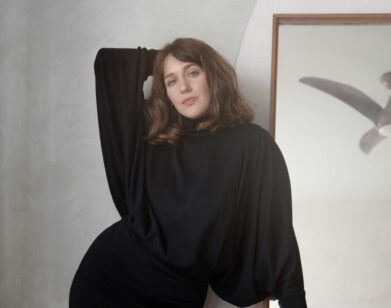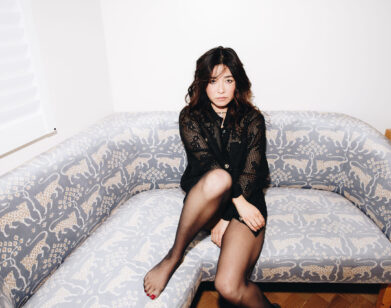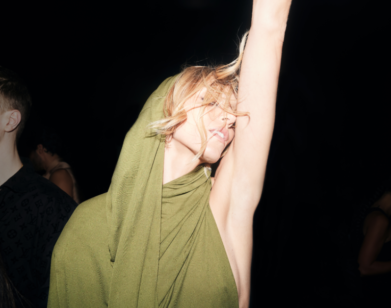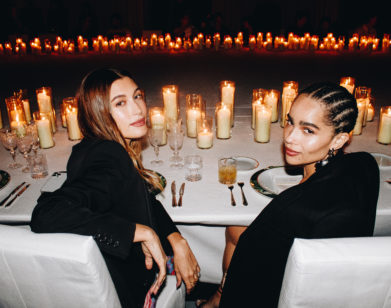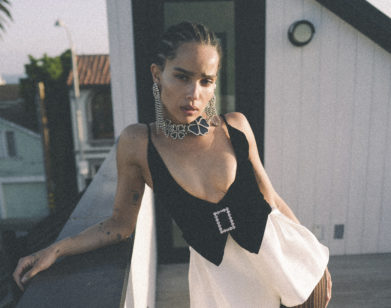music!
Lola Kirke and Zoë Kravitz Talk About New Music and an Old Love Triangle

The friendship between Lola Kirke and Zoë Kravitz began with a “falling in.” The pair first crossed paths as young New Yorkers—Kirke was 19, and Kravitz 21—when they found themselves in the middle of a youthful love triangle. But that’s ancient history now: in the intervening decade, Kirke established a steady career in film, which included roles in Mozart in The Jungle, Mistress America, and Gone Girl; while Kravitz tried her hand at screenwriting and film direction. The two actors also became close friends, to the point where Kravitz, now 31, was one of the first people to hear an early draft of Kirke’s sophomore record last summer. Lady for Sale, out last Friday, is the glitzy lovechild of country and disco that Kirke always dreamed of making, but that doesn’t make it any easier for the artist to release it. Here, Kravitz, a musician herself, asks Kirke a few questions about good art, bad reviews, and fake orgies.
———
ZOË KRAVITZ: We’ve never zoomed.
LOLA KIRKE: We’ve never zoomed. You look great on here.
KRAVITZ: You look blurry.
KIRKE: Oh, my camera’s really dirty. Are you at your grandmother’s house?
KRAVITZ: No, I’m in London where it always looks like somebody’s grandma’s house.
KIRKE: Literally.
KRAVITZ: You can’t go anywhere without seeing a floral print. Sup dude! How you doin’?
KIRKE: I’m a bit sleepy and Santino’s a bit needy, but other than that—
KRAVITZ: So, is it okay if like 90 percent of my questions are about Santino [Kirke’s dog]?
KIRKE: 100 percent. Santino, say hi!
KRAVITZ: My baby! Oh, my goodness. You love me.
KIRKE: He does. He really does. He says he’ll text you later.
KRAVITZ: Okay, he always says that, but I know he’s kind of a player. So, I’ve been given some questions and I wrote some of my own, and we can just see how we go. How did we first meet?
KIRKE: Is it okay to say that I considered you an enemy for many years? [Both laugh] I will say, the journey from enemy to dear friend has been one of the most affirming of my life. To go from not liking someone so much to being so close—I consider you one of the smartest, coolest people I’ve ever met, and it gives me faith that first impressions can be dead wrong.
KRAVITZ: I mean, in your defense, it wasn’t even that you were wrong. We had quite a complicated beginning of a friendship that included a love triangle. That’s all I’ll say. I’m using love loosely, but a triangle. In our 20s in New York City.
KIRKE: I mean, I was actually a teenager.
KRAVITZ: God damnit. I was like, what, 21?
KIRKE: You must have been 20 and I was like 19, which is basically a grown up in New York.
KRAVITZ: How old are you now?
KIRKE: 40? [Both laugh] I’m 31.
KRAVITZ: Yeah, I’m 33. But that song “The Crime,” on your album, is about the person that we had our falling out with.
KIRKE: Our “falling in” really. So yes, that’s how we met.
KRAVITZ: The next question that I wrote down is: how are you?
KIRKE: I’m feeling really good today. I don’t know why, because I’m really, really tired. I’ve had an intense week of like, ego death. I shot a four day group sex scene and broke my foot.
KRAVITZ: Actually?
KIRKE: No, sorry, that’s a gross overstatement—I’m kind of limping. And in between takes of getting pounded at a fake orgy, I kept running upstairs and making sure that my entire music business wasn’t collapsing. I couldn’t let myself take any breaks, because then everything would fall apart—
KRAVITZ: Meaning you couldn’t just focus on one thing at a time?
KIRKE: Yeah, which makes me think I have mild to severe ADHD.
KRAVITZ: You’re a hard worker.
KIRKE: I’m good though. It’s hard to be miserable when it’s springtime in New York.
KRAVITZ: New York is just my favorite place. I’m very upset that you’re not there all the time anymore.
KIRKE: I know, but neither are you Zoë, let’s be real. You’re at your grandmother’s house in London right now.
KRAVITZ: Look, I go where Grandma goes, you know what I’m saying? Okay, the next question I have is: what’s your hope for today?
KIRKE: That’s so cute. My hope for today is that I can maintain the optimism I woke up with.
KRAVITZ: By evening you will be having a martini.
KIRKE: I’m doing a night shoot tonight. So, by evening I’ll be—
KRAVITZ: —Getting pounded?
KIRKE: By a man with a thing over his penis so that I can’t actually feel it.
KRAVITZ: [Laughs] Oh, no.
KIRKE: Thank god though, honestly.
KRAVITZ: What is the story that you’re telling with this album?
KIRKE: It’s basically about falling in love with someone who you shouldn’t be in love with, and exploding your whole life to be with that person. It’s a love story with a kind of anticlimactic but content ending. There are other things peppered in, like that song “Lady for Sale,” about the self-objectification that is necessary when you want a career in the arts.
KRAVITZ: How did that song come to be?
KIRKE: Well, I had just had my wisdom teeth removed and was on a lot of drugs. As I mentioned earlier, I may have ADHD, so I couldn’t even be subdued by oxycodone. I was so depressed that I hadn’t been working. You can relate to this, I’m sure. I started working when I was 19—even if it wasn’t my dream job, I was always steadily working. Obviously the pandemic put the brakes on that in a massive way. So many women I know, pre-pandemic, were on the brink of all of these big things that, in the last two years, have disappeared. That was a big part of my experience. And the internet became this even bigger beast in that time. I remember your private Instagram, where you were like, “How funny can I be on here?” instead of, “How beautiful can I be on here?” There’s been an inflation of internet personas that has made it incredibly difficult to be an artist now.
KRAVITZ: Even just to be a person, right? I feel like we have split personalities now, and we’re living in literally two different realities. Bouncing back and forth can’t be good for our brains.
KIRKE: It’s been dark putting out this record and going back to work. I’ve been getting so many texts from friends, even in fights with people, who are like, “You weren’t there for me, because you’re out having so much fun all the time.” I wanted to make a sparkly ‘80s disco-country record, so I’d better look like I’m having a good time. People get these ideas in their head about what you’re doing based on the internet narrative you’ve created for yourself. I’m not gonna be like, “I’m so sad.” That’s not the product I made, but that doesn’t mean I’m not experiencing a tremendous amount of rejection all the fucking time. I think that there’s this misunderstanding about how much rejection and heartbreak that even a person who gets a lot of things experiences constantly.
KRAVITZ: Absolutely. I think if you look like you’re succeeding in any way, then people turn you into this two-dimensional idea. That’s the other thing about having any kind of internet presence as an artist—people project what they need onto you. You can be an inspiration or you can be a punching bag, but it really has nothing to do with who you are as an actual person.
KIRKE: Totally, and the artists that I admire have always helped me to get closer to who I am, rather than who they are. Like, how incredible to listen to a Joni Mitchell record or watch a Will Ferrell movie and just be like, “Oh, I’m that sensitive, I’m that kind of goofy.” So often, our opinions about others are really reflections of who we are. Like, if I connect to you or I don’t connect to you as an artist, couldn’t that just give me more information about my true self, rather than considering you a failure?
KRAVITZ: What is your definition of failure when it comes to putting out music?
KIRKE: I think it’s just not making the music you wanted to make.
KRAVITZ: You’ve already done that, though, right?
KIRKE: Yeah! I saw a really funny review the other day, it was a bad one. I read it, because because I’m like—
KRAVITZ: Because we must. [Both laugh]
KIRKE: Because I’m determined to be miserable. I sent it to Austin [Jenkins, Kirke’s producer] and he was like, “Lola, this is an amazing review. They said that you did everything you tried to, they just didn’t like it.” It didn’t say that I failed. It actually said I succeeded in a certain way. They just hate my—
KRAVITZ: They just hate your idea. [Both laugh]
KIRKE: So, that’s incredible. I’ve been living by a really horrible metric of success all my life which is, how well received is this? Instead of asking, is this what I wanted to make? That paradigm is far more fulfilling.
KRAVITZ: When you were in the studio making this album, were you thinking about what people like?
KIRKE: Absolutely not. If I had made a record that people could digest easily, I just wouldn’t have made the record that I wanted to make. I will do anything to promote this record, because I love it so much and I want people to hear it. Whether or not people like it, I don’t really care, but I want people to hear it and then make their decision.
KRAVITZ: I have this metaphor. When you go to a wedding, or something where you’re trying to feed a lot of people, the food’s almost always bad—because they’re trying to cook for everybody, right? Don’t make it too spicy, don’t make it too sweet. I would rather make food that was too spicy for most people, but the ones who can handle it fucking devour it and want to come back for more. I think making a bold choice, like putting two genres together that don’t normally go together like you did, is going to make some people uncomfortable, and other people fall in love with it. That’s really what bold art is about.
KIRKE: I agree, but I think there’s less room for that now, because being an artist is so fucking expensive. You need this mainstream cosign to make it work, unless you have other means, which I’m so grateful for as an actress. But I’m exhausted, because I’m like, “I can’t quit.” because then I could never afford being a musician. I don’t know if you’ve had this experience with directing your movie, but there’s no time to sit down.
KRAVITZ: The funny thing about mainstream culture is, every now and then someone will break through and do something really different that everyone loves. Then that becomes the culture, and everyone jumps to that place, until someone breaks out of that, and so on. I really think the culture makers are the people who break rules.
KIRKE: I was just thinking about the idea of trailblazing—you’re going into the woods, and you’re weed whacking, making a new trail for other people to come down as well. It’s not just for you. I was like, “Who do I want to follow me down this trail?” It’s hard to want to be an artist when part of being an artist is connecting with people, because people can be so awful. You walk out on the street, and I mean, New York is kind of incredible, because the good and the bad are always bubbling at the same time, but people can be really disappointing and scary and mean. But I do think that the beauty of making art is that you’re actually connecting with everyone’s highest self. It’s your highest self connecting with everyone else’s highest self. All that other stuff has no place in art, really.
KRAVITZ: You’re also trying to connect with people in real life. People will never be as mean as they’ll be on the internet. People are actually really wonderful. There’s something about the internet that has actually restored my faith in humanity because I’m like, “This place is terrifying, but out here in the real world it’s wonderful. I like it out here.” I think the biggest problem with the internet when it comes to art, is that art is about conversation, right? The internet is not a conversation, it’s a bunch of people pushing energy and ideas in one direction. You’ll never see a tweet that says, “Oh, interesting. I never thought of it that way.” In the real world, there are people walking around playing your albums on their headphones and feeling it in their chest. That’s really what you’re making music for. There’s no way for you to know until someone comes up to you at a show and tells you what your album means to them. That’s really all that we should be taking to heart when it comes to the things that we make.
KIRKE: Right, I mean, you can compare yourself so easily online. I can literally look, statistically, at how much better you’re doing than I am right now. It’s really hard not to resist that. I have a beautiful life that I’m really proud of, and then I go on the internet for five minutes and I’m crying.
KRAVITZ: Do you think the impulse to do so many things at once has to do with being a woman and having to prove that you’re tough?
KIRKE: Yes, and proving that to myself. When you grow up with things that society privileges, like beauty or wealth or whatever it is, people don’t always take you seriously. I’ve internalized that in a certain way. All I’ve wanted my whole life is for people to be like, “You’re so kind and good at what you do.” I feel like everyone thinks I’m a monster, but that’s also probably narcissism.
KRAVITZ: That’s the punching bag thing, too.
KIRKE: I want to be taken seriously, but that’s a reflection of me not taking myself seriously more than anything.
KRAVITZ: Okay, we don’t have much more time, so let’s do some rapid fire questions. What about this album makes you the most proud?
KIRKE: The songwriting.
KRAVITZ: What’s your favorite thing about playing live?
KIRKE: Looking in people’s eyes, but not for too long because that would be creepy.
KRAVITZ: That’s weird. [Both laugh] What’s a question you wish you were asked more often?
KIRKE: I wish I was asked more about specific lyrics. I wish people would be like, “How did you think of that?!” And I’d be like—
KRAVITZ: You’d whip out a pipe and a monocle. Worst thing about the internet?
KIRKE: How much time it takes away from real life.
KRAVITZ: Best thing about the internet?
KIRKE: Honestly, videos of cute dogs.
KRAVITZ: Yes, I think that is the best thing about the internet. We are living in a simulation: true or False?
KIRKE: Unfortunately, probably true.
KRAVITZ: New York or Nashville.
KIRKE: Oh, God. [Whispers] New York.
KRAVITZ: That’s right. What do you love most about country music?
KIRKE: The stories within it, and the pedal steel parts.
KRAVITZ: What do you love most about disco?
KIRKE: Dancing.
KRAVITZ: What was the last dream you had that stuck with you?
KIRKE: Oh my god. The other night I was yelling at someone in my dream so angrily that I woke myself up.
KRAVITZ: “Broken Families.” Tell me more.
KIRKE: Oh, dear. It was a co-write with my friend Courtney Marie Andrews, who’s incredible. We wanted to write a song for country radio, but we ended up just writing a pretty specific song about our own lives.
KRAVITZ: “Better Than Any Drug.” Tell me more.
KIRKE: I was asked to write a song that I would have loved when I was a 12-year-old. My music publisher was like, “Just write something that you would have loved when you were 12!” So, I was like, “Drugs, right. Perfect.”
KRAVITZ: When was the last time you wished you’d handled a situation differently?
KIRKE: You know what, I think I’ve been handling situations pretty well lately. I stand by my decisions.
KRAVITZ: Oh, my god, that’s amazing. My last question is: what are you addicted to?
KIRKE: Probably just doing things, honestly. I’m addicted to doing things.
KRAVITZ: Like drugs? I’m kidding. [Both laugh]
KIRKE: I’m addicted to doing things, like cocaine. Okay, love you!
KRAVITZ: [Laughs] Okay, love you!
KIRKE: Oh, thank you Zoë.
KRAVITZ: You’re so welcome. I’m so proud of you. The album is so beautiful. It really is. It’s such a wonderful storytelling, and it’s quite dark, but also so uplifting at the same time. It’s a really difficult combination, and kind of what you want out of all art, you know what I mean? You want it to break your heart and also make you feel like anything’s possible.
KIRKE: You’ve been so kind to me about it. You were one of the first people I played it for this summer.
KRAVITZ: I remember, at your mom’s house. Blew my mind.
KIRKE: Well, have a great time with Grandma over there. Or Gran, as they call her.


